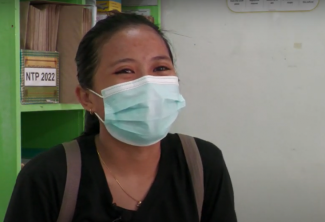When 15-year-old Jhonacie first found out she was pregnant, she was scared.
What would her family think? What about her education? How could she take care of a baby when she was still just a teenager herself?
“I was so scared,” she remembered.
Unsure of what to do, Jhonacie and her mother visited Paete Rural Health Unit, a USAID-supported adolescent friendly health facility. USAID-trained healthcare workers assured her that they would be with her every step of the way.
“I got all my checkups here, and they gave me the medicine I needed. My test results came back quickly,” said Jhonacie. “And the health workers are friendly and not scary,” she added with a smile. In line with the Philippine government policy on adolescent health, Paete Rural Health Unit connected Jhonacie to a hospital to deliver her baby.
To help adolescents like Jhonacie better access the services needed, USAID helped strengthen more than 150 adolescent-friendly health facilities across the country—like Paete Rural Health Unit. These hospitals and clinics put extra emphasis on the privacy and confidentiality for their teenage clients; offer adolescent-friendly counseling services; and have a comprehensive system for referring teenagers for other services they may need.
To help prevent teenage pregnancy and other health issues, these centers screen all adolescent patients for risks such as teenage pregnancy, drugs, suicide, and domestic violence and refer them to other facilities such as the local government’s child protection unit or social welfare office if necessary. They also offer family planning counseling and encourage teenagers to talk to their parents about contraceptives and other family planning services.
USAID helps strengthen adolescent friendly health facilities by training healthcare workers on adolescent-friendly counseling, linking them with other organizations that offer services for teenagers, and connecting them with local schools so students can more conveniently access their services. In addition, USAID partnered with the Department of Health, the Commission on Population and Development, and the Department of Education to launch the I Choose #MalayaAkongMaging(link is external) and Konektado Tayo (We are Connected)(link is external) social media campaigns about adolescent sexual and reproductive health. These initiatives help prevent unplanned pregnancies, reduce high-risk pregnancies, and enable women and couples to determine their family size.
Thanks to USAID’s partnership with the Department of Health, over 210,000 teenagers like Jhonacie have been able to access comprehensive, appropriate medical care since October 2021.
After her son was born, Jhonacie brought him back to Paete Rural Health unit for his immunizations. USAID-trained healthcare workers also helped Jhonacie learn to take care of her child and provided her with family planning counseling so she could make informed choices about her family size.
“It’s difficult to be a teen mom,” said Jhonacie. “But they’re very helpful here.”
Nearly three years later, Jhonacie, now 18, returns to Paete Rural Health Unit for another check up—this time carrying her two-year-old son Isaiah in her arms. Isaiah squirms and squeals happily as his mother puts him down. He toddles across the room, smiling mischievously at health workers.
As baby Isaiah runs back to his mother, Jhonacie scoops him up and smiles. Despite the challenges of being a teenage mother, she is determined to finish her studies and build a happy, healthy future for herself and her family.

USAID
